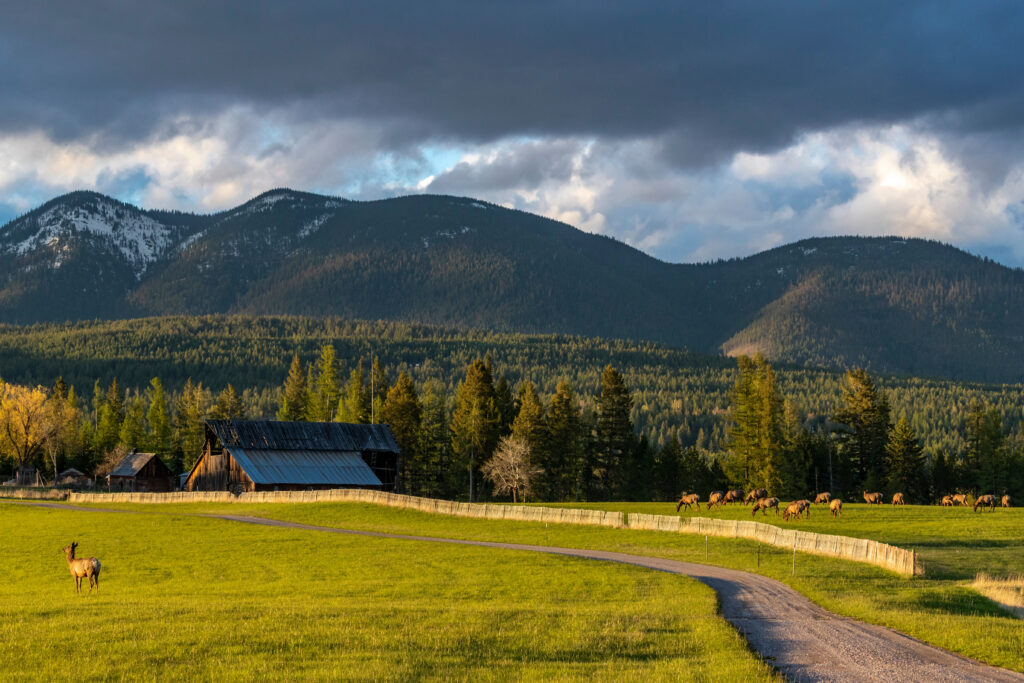
Perusing our website, you may have noticed that Manchester Capital has expertise and a track record in acquiring and managing large tracts of land. When clients hear of this, a popular question arises: “Is ranchland a good option for me?”
The answer begins with our evaluation of a client’s unique goals. Our introduction to ranchlands began with a family well-suited to the opportunity. The client asked us to find a remote wilderness family retreat with intrinsic values of natural resources, scenic beauty, and a working ranchlands investment component. Over the past 15 years, MCM’s Real Estate Services team has acquired and managed over 120,000 acres of timberland, ranchland, and rural property. We have helped turn our clients’ visions of conservation, into sustainable investments that can be transferred to future generations, by developing strategies to help mitigate the struggles of covering annual carrying costs often associated with owning large tracts of land.
The financial realities of owning a multi-generational ranch and timberland is a story that has repeated itself in the West for generations and, unfortunately, often led to unhappy endings.
Many of the visionary founders of these large ranches have been able to achieve their goals of accumulating wealth and legacy through land acquisitions initially made possible by the 1862 Homestead Act, and subsequently by purchasing small homesteads and assembling them into large tracts of land.
The eventual shift from the agrarian economy and society over the years led to a migration of generations away from agriculture to urban areas with careers in factories and other industries. As a result, many children who were set to inherit ranch and timber lands became less interested in maintaining them. Many landowners faced with the economic challenges of the modern era, and the pressures to generate income, often sold off various parts of their ranch and timber lands for development.
As people and their values changed, opportunities to prosper often attracted them elsewhere. Unfortunately, as many parts of the world have changed rapidly, wildlife and natural habitats are frequently the victims.

When Manchester Capital receives an assignment from a conservation-minded client, we approach any investments with their vision as the driving factor: to preserve and protect landscapes and working lands from the pressures of development and destruction of natural ecosystems. Through our experience and expertise in managing landholdings, we have developed creative investment management plans to add several alternative income streams to help provide the economic stability that can be required to preserve these landholdings in large contiguous tracts that help benefit wildlife and preserve open spaces.
Some of the tools we’ve utilized to achieve the goals of limiting the future development of the property and securing economic benefits for the clients have included:
A legal agreement between a landowner and a nonprofit land trust, government agency, or other qualified group, that establishes restrictions on the future use of some or all of the land. These easements often result in reduced property taxes and can potentially reduce future estate tax liabilities in addition to providing substantial income through the sale of these easements. MCM has secured several million dollars in direct payments to our clients for conservation easements.
Landowners can earn additional income by developing carbon sequestration projects on their timberland and grassland holdings. MCM has developed and sold several million dollars in forest carbon credits for our clients. Additionally, soil carbon credit markets opportunities are expanding, and MCM believes this will become another viable source of carbon credit-based income strategies. Soil carbon projects are based largely on the management of sustainable grazing practices, and regenerative agriculture projects.
USDA programs offer landowners the opportunity to receive funding to improve their properties through projects centered on the conservation of natural resources. These projects include forest health, water quality, and rangeland improvements. Through our direct management and navigation of these complicated grant opportunities, MCM has secured several million dollars in funds to our clients, for the direct improvement of their properties.
Landowners may choose to capitalize on recreational activities that can draw many people to these rural areas while remaining protective of the land and natural ecosystems.
The MCM Real Estate Services team has used their knowledge and expertise to work with State and Federal wildlife agencies to develop wildlife habitat improvement projects and create sustainable harvest programs in order to obtain highly sought after landowner hunting tags. As a result, MCM clients have received over $500K from these programs.
There are many opportunities to be explored based on each client’s unique values and priorities. We work directly with our clients to manage their investments, providing a hands-on opportunity for families to participate in the implementation of conservation and financial goals. Additionally, client families can enjoy the educational, cultural, and recreational aspects of the project. If you are interested in investing in land preservation opportunities, the MCM Real Estate Services team is ready to start a conversation with you and your family. Reach out to your Wealth Manager or MCM contact to learn more.
Disclosures
This material is solely for informational purposes and shall not constitute a recommendation or offer to sell or a solicitation to buy securities. The opinions expressed herein represent the current, good faith views of the author at the time of publication and are provided for limited purposes, are not definitive investment advice, and should not be relied on as such. The information presented herein has been developed internally and/or obtained from sources believed to be reliable; however, neither the author nor Manchester Capital Management guarantee the accuracy, adequacy or completeness of such information. Predictions, opinions, and other information contained in this article are subject to change continually and without notice of any kind and may no longer be true after any date indicated. Any forward-looking predictions or statements speak only as of the date they are made, and the author and Manchester Capital assume no duty to and do not undertake to update forward-looking predictions or statements. Forward-looking predictions or statements are subject to numerous assumptions, risks and uncertainties, which change over time. Actual results could differ materially from those anticipated in forward-looking predictions or statements. As with any investment, there is the risk of loss.

Today’s most dangerous cyber threats don’t come from hackers breaking into systems- they come from someone convincing you to open the door for...

As investment stewards, we at Manchester Capital seek to preserve, protect, and grow client assets given the prevailing market, economic, and...

The recent swoon in the market could be attributed to confusion and uncertainty around the United States' new tariff and trade policy. The Trump...